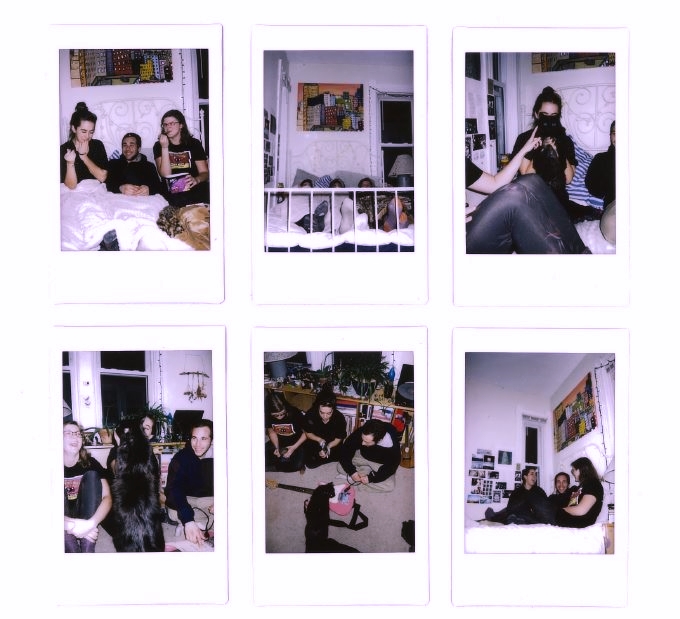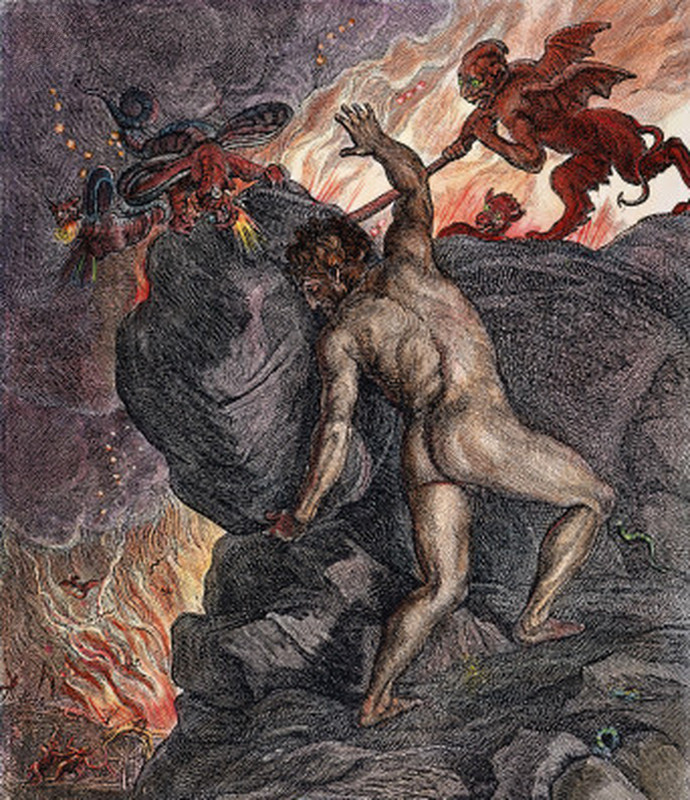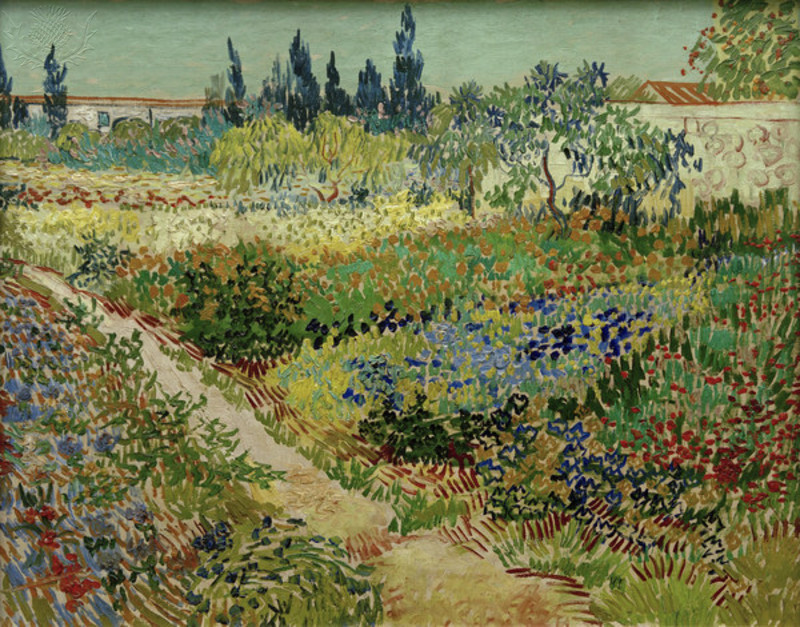by Emma R. Collins

Berlin Street scene at the corner of Moll- strasse and Hans-Beimler-Strasse / Volkmar Thie / akg-images / Universal Images Group
She has blue eyes, the same blue that waits outside my window on a clear, cold day. She rides a red bike, red like her lips when they curl up, full of open-mouthed smiles. She laughs at things I don’t understand. I love her. But I’m afraid.
I called her when I had nothing left, hoping maybe she could spirit me away. A dark place. A lonely place. She was the only one my throbbing head could think of sitting on the bathroom floor. She would make everything alright again. And I was so happy when she told me, “Come on!” …because she didn’t understand, and I couldn’t stomach telling her. So I went.
Now I live where the street lights at night turn the windows orange. Feeble light. She’s a rush of color and sound that can overwhelm a simple person with simple problems. And my problems must still be simple, because she drowns me locked up behind dirty old orange windows.
It was so like her. Not to ask. Just do. I called her when they threw me out of the house in disgrace and she smelt me like blood in the water. It was a new adventure. A new chance. New life. And now I’m here, in this place, in this country, and the lights down below change: a bloody red, a sweet green, a dirty orange.
Only three weeks have gone by. The light bulb in my desk lamp is blown out. I was wrong. I’m an invader here. I sit in the twilight and resent my useless lamp. Inside my room it’s quiet and dark, a cold womb. I like it there. She can’t stand things that are stagnant. She drags me out prematurely. I’m only an infant here. I wish she would just hold me and tell me it would be okay.
My Beth.
Tell me it’ll all be okay.
*
A door slams somewhere below us. The muffled sounds of people living other lives filter up between floorboards I haven’t swept yet. I want to read. Because I can’t possibly do anything else. But I need to be near her. Something flamenco comes from small, orange speakers flecked with flour. The kitchen is warm and the windows fog with a breath of gourmet.
“Dellie, watch. Watch!”
I look up to see Beth tip her head back, open-mouthed and smiling, as she tosses her hand-kneaded dough into the air. She laughs and catches it again, punching a small hole. She starts singing as she drops the dough onto the countertop. She has a Barcelona accent to her Spanish.
Bar-tttthhh-elona.
“I wish we had a brick oven,” Beth groans with a breathy sigh. “Did I ever tell you about the time I made one with Max and Sean?” Her hips sway as she smooths the dough. “I got the mortar all over my brand new jeans. I was so mad!”
“Mmm,” I said. My book sits limply in my lap. The kitchen smells of tomato sauce. She made it by hand. It simmered all morning while I slept. My open-mouthed world is never shy about starting the day without me.
“Have you ever tried to make something like that?” she asks me.
I raise my eyebrows. “I made um, a bridge once.”
“Really?” Her eyes are so big and blue.
“Just a little one,” I murmur. “For a project. About physics. It was just um, wood. Those popsicle stick things.” It never occurred to me that while I was babysitting and cleaning houses, trying to pass a high school physics class…I could have been making brick ovens.
“There’s just something about working with stone, you know? It really makes you start to appreciate those old buildings and how beautiful they are. How much time and work goes into something like that. Makes you wish they still built things that way.”
“Mmm.” I’m pretty sure they did, but instead I look down at my book. The flamenco music sways. Something hitches in my stomach and I bite down on a sore lip. I cough once, and look at her. She’s slicing pepperoni, a mound of fresh mozzarella at her elbow. And I think, maybe. Now? “…Beth?”
There’s a heavy whump. followed the grunt of a too-big door grinding over an old wooden floor I haven’t swept yet. I catch myself as the door to their flat, our flat, shakes and shudders open.
“Kaminey!” a warm voice exclaims. “Someone needs to fix this!” In through the sliver of space that has been pushed open comes the small body of tiny Indian girl with dusky brown skin all wrapped up in jeans and a heavy leather jacket.
Beth doesn’t hear me when I ask her name, so she answers the Hindi explicative with a few phrases of her own. There’s a brief exchange, mild banter. I feel ten thousand miles away.
“It’s getting a lot better!” Rajani smiles, switching to English for what I know is my sake and mine alone.
Beth laughs, pretty and open-mouthed. “I bought this old Hindi dictionary. It probably sounds very formal.”
Rajani laughs in return. “Very university!” The tiny Indian girl pushes back against the too-big front door and mutters under her breath. Once the door is closed again and she’s locked everything she throws me a smile and tosses her book bag onto one of the many-colored chairs that surround their, our kitchen table.
“What are you reading?” Rajani asks.
I feel a warm embarrassment flush my face. “Oh, um…” I look at the cover of my book as if I’d never seen it before. “Rising.”
“Who wrote it?”
I shrug. “Um, David Tanner?”
“Didn’t he write that stupid series about that spy guy? Raji, taste this. I got it from the Metzger right around the corner.” Beth hands off a slice of fresh pepperoni and mozzarella. I sink a little lower into my pillow and blanket while Rajani sucks playfully at Beth’s finger tips to taste the morsel. “I’m so happy I’m not a vegetarian anymore,” she sighs, satiated.
“Good, right?” Beth smiles, proud of herself.
“Yeah, he did,” I say, but quietly. I try not to be heard. I like David Tanner, and Ryan Crow, the black-listed CIA spy with a vendetta and the death of his wife to avenge. “He’s written a lot of stuff…”
“When does Harris get back?” Rajani wonders aloud.
“He has lab until four,” Beth informs her politely. “But Gunter should be back soon. I think he just went out for some groceries. Hey, do you guys want to go to the Rot Nacht Truppe tonight? They’re doing this really cool interpretation
of Hamlet in the contemporary with modern dance and tango.”
I sit up suddenly. “Tonight?” But she doesn’t hear me, or she forgot, because she’s spreading the warm tomato sauce she made by hand over the dough and I’m just a passing thought.
“Ja, sounds like fun.” Rajani spoke German fluently. She had been living in Berlin for three years, studying medicine. She’s going to be a neurosurgeon. She loves beer and wurst. I like Rajani. She’s kind, but she’s aware. I think she knows what I never say, but she never says it either.
“Dellie, you want to go?” Beth asks, again.
I swallow as if I had never spoken. “What?”
“Rot Nacht Truppe. Wanna go? Harris probably will, and Gunter.”
“I don’t think Gunter’s into that,” Rajani yawns.
“Daw, he’d like it,” Beth assures her. “It’s totally his thing.”
“I don’t really like them,” I admit, watching to see if her eyes come to me then.
“Aw, really?” And yes, they do, as if I’ve dropped some shocking revelation. “Why not?”
I stare at her. “They’re…intense.” They scared me.
“But that’s the point!” she cries.
“I think I’ll stay in.” She doesn’t remember at all. She doesn’t remember our dinner plans or the fact that I have been trying to get her to look at me, look at me, for more than fleeting second. Can’t you see it? Can’t you see it in me? But it’s not really worth mentioning now. I’d have had better luck catching the wind.
“You always stay in.”
“I’ll go,” Rajani says.
“See? Raji loves me!”
I feel very, very small.
They laugh and smile and eat fresh pepperoni from their finger tips and the hitch in my stomach makes me nauseous. I get up without them noticing and pad down the hall, dirt on my socks. I close the bathroom door behind me and turn on the faucet. The tap. I can’t remember the German word. I kneel in front of the toilet and feel my throat tighten. I’m grateful, for the first time, for a loud flamenco.
*
Beth went out. I don’t know where. Rajani went back to the university library to work on her paper. I come out of my room to find the pizza cold on the countertop. I want to eat, but my mouth is heavy with ash. The flat is dim. The skies are grey. There’s no color in the windows.
I try a bite, but it’s too sweet. Instead, I wash the dishes because I need to start pulling my weight and I try to think of words I should have known.
Faucet. Wasserhahn.
Water. Wasser,
Soap. Seife.
Clean. Sauber.
I am clean. Ich bin sauber.
Something hot opens my thumb and I gasp to see a plume of red born under the grey water. I snatch my hand back and the wound stings, blood running pink down my arm. I spot the knife at the bottom and wonder why I hadn’t seen it before. My stomach tightens with that familiar twitch and I run to the bathroom to find a bandaid.
There’s blood down my arm and in my sleeve, on the broken tile that’s tinged with age and down the side of the Wasserhahn, and I don’t know how to call for help in a country where my phone doesn’t work. I don’t have the money to buy one that does. I don’t know why I’m crying while I drain the blood with cold water, stinging my flesh. The cut is small, insignificant, but my heart hammers.
I hold my hand as if to make a plea with mein Gott, but when I find myself on my knees again, wrapped up in clumsy gauze with little more than a paper cut, I realize the tears are not for me. Not, at least, all of me. My stomach is taut like a drum and I look at the toilet but I close my eyes. I think of Beth. I’m scared she’ll find me here. But I want her to. I need her to.
Still, I’m scared of what she’ll say.
A heavy fist hits the door and I jump. A bored, firm demand to get the hell out, probably. I don’t know. I don’t know anything.
“S-sorry,” I call out. I fumble to mop up the red mess. The heavy fist hits again, and again, and I finally have to surrender. I’m still clutching the water-logged tissue dyed pink with my absent-minded stupidity when I open the door.
“Aw, Dellie!” Harris beams. He smells like sweat and damp wool. “Thought it was the Kraut. Sorry about that. Alright there?” He gives a nod to my hand. I hide it behind my back.
“Yeah, yeah.”
“Cut yourself?” He frowns. His hair is wet, a dark brown. He has a band of freckles across his large nose.
“I’m fine.”
“Yeah…alright. Well, I have to piss, so…” He grins.
“Right, yeah, sorry.” I duck away, hot and cold. Harris has the kind of face that makes you think you know him, or you’ve seen him somewhere before. I have. I’ve seen his face, or one like it, I should say, in the dim strobing light of a club, dazed and confused with an alcoholic kiss. I have a hard time looking at Harris, thinking about another face, in another country, whose grin isn’t as cheeky or sweet.
Harris says something else to me. Maybe it’s kind. I don’t know. I don’t really care either, because I’m trying to avoid him and thinking of the things he reminds me of. I just hope there isn’t any blood left. I wish my head was the same.
Rot, she had said. Red..
I go to my bedroom, a tiny room that feels more forgotten than home. But it’s safe. I close my door, forget my bulb is blown, and pull the rough-hewn blanket to my chin.
*
Beth came home while I slept.
She’s gone again in the morning, no note. Rajani says she may have gone for a run. She may as well have flown to the moon. The kitchen smells of something fresh-baked, a pastry I can’t pronounce. Rajani leaves with Harris to study and, as always, I remain.
After a while, when my tea has gone cold, I decide I’ll read. My room is dark. I try to turn on my lamp. Nothing changes. I stand there for a moment, and in that moment, with a throb in my thumb and a hollow in my stomach, I don’t think of her.
I don’t think o
f when I called her, asking if I could stay.
I don’t think of the moment I walked away from that place where no one would have me, pretending she was all I’d ever need.
I don’t think of making that choice on a cold day in November, when I had already been so alone.
I don’t think of what I want, what I want so badly being her, all of her, every bit all for me. I want my future. Our future. All of us. I want an impossible future.
But I don’t think of any of those things, standing in the grey dim of an early-winter morning. Instead, I think of one thing. One very, simple thing.
A light bulb.
I fix my bandage in the bathroom. I don’t vomit this time. It must be passing now, into the next phase of my slow evolution. I almost smile. Almost. There is a dim scent of something musky hanging in the air. I breathe deep, recognizing Beth, the scent she always wears after a night of dancing, her long hair flying around her waist, flying around her shoulders, bare and a lovely pale. Her scent.
When I open my eyes my thumb is still sore. I tighten the bandaid and brush my hair while she settles into the fibers of my clothes. My stomach is calm. It’s quiet in the flat. Even the lives that go on beneath the floors I should sweep later seem to be hushed. For a very fragile moment, something lifts and I feel light.
I leave the bathroom with clean socks, and I remind myself to sweep the floors. I don’t make it past the kitchen though, because the too-big front door whumps and drags open before I can escape.
“Beth?”
But the frame that fills the threshold is tall, too tall, and big, with pale hair. She is small and dark, like a forgetting dream. This is a little more abrupt. A wakeup call, harsh and upfront.
His name is Gunter, and he is the only one among us born here. I see him on the off-hour, when nothing else in the universe seems to be happening. He comes and goes and it’s almost as if the flat is haunted. I might have seen him once in only his boxers, when he thought no one else was home and they still had to remind each other I lived here. He has a strange voice, as if cold glass could move.
I can’t recall in that moment if he speaks English or not. I gawk for a second, because he’s standing between me and my light bulb. But he seems to regard me as someone would a piece of furniture, maybe misplaced a few inches.
He comes in, closes the door, moves past me, and puts a cloth bag on the table. I hesitate for a second because I feel compelled to say something. The flat is quiet in the mornings. But this quiet is uncomfortable and very, very pregnant.
“G-gut…guten…”
“There is ginger ale and crackers in the bag,” he tells me.
My thumb throbs. “What?”
Gunter gestures to the cloth bag. “For your stomach.”
“Oh.”
He puts his keys on the table filled with notebooks on law and medicine and literature studies and futures.
“Um, thank you.”
He picks up a stack of mail to file through and I think that’s it. Quiet returns. There’s frost on the windows, white and fragile. Beth’s scent is still on my shoulders. I feel my stomach tighten because standing there in the presence of our formidable ghost, I suddenly decide that tonight I’ll tell her. I’ll tell her everything.
Lost in my own head, I don’t touch the bag as I walk by the table. I’m too busy constructing the fragile glass of what I will say to her when she finally comes sweeping in through the heavy front door. It takes a moment for me to pull on my old pair of hiking boots but eventually I remember how to tie a knot and straighten up to reached for the spare key.
“You should see a doctor,” Gunter says as I struggle to pull open the door, breaking my silent conversation.
“What?” Beth, where was Beth? “I don’t…”
“Go see a doctor, Dell,” he tells me. He sits down at the table with his mail in-hand and his eyes won’t let go.
“I don’t need a doctor,” I scoff, panicked.
He shrugs, but this time, his attention is firm.
“I don’t,” I insist. Maybe a little too loudly.
Gunter shakes his head. “You should go.” He stares at me with his dark, dark eyes.
“Why?”
Why, why anything, just why? This asshole. How could he ask me why…I don’t know why! Am I about to cry? My head hurts. My stomach is tight. All of the sudden the strength I thought I had rushes out of me. I’m so swollen under my too-big sweatshirt, and no one even bothered to ask. He just knows. But Beth didn’t even notice.
“Why?” I snap now, edgy, sharp as ice because his silence has gone on far too long and Beth should be home soon. I hope. I can almost hear the snap-snappidy-snap of her boots trotting down the long, dirty hall outside. And my heart is in my head and I imagine her coming through the doorway and she’s smiling at me, her mouth open-wide and honest and simple.
“Hi, Dellie,” she’ll say to me, singing, wrapping me up in a hug. “Missed you last night. What did you want to tell me?”
Everything.
But maybe I won’t have to say anything. Maybe, she’ll just know to love me, even with my mistakes. And we’ll be happy. Can’t we be happy?
“Go for your health,” Gunter is telling me, snapping me back to where I stand in the warped and scratched threshold of the too-big door.
“I am healthy.” I insist. I glare at him, challenging him, daring him to say what we both know has grown beyond silence now.
“Then for the baby’s,” he says. And as simple as that, he walks away from me. But I don’t have time to react, because I hear someone turning a key in the door and I’m not ready for her.
Emma R. Collins of Ashby, Massachusetts, studies English and Psychology at the College of the Holy Cross in Worcester, Massachusetts, and hopes to become a literary editor.
Photo credit: Berlin / Moll-/ Hans-Beimler-Str./ Photo. Photograph. Encyclopædia Britannica ImageQuest. Web. 14 Mar 2016. http://quest.eb.com/search/109_155594/1/109_155594/cite


















